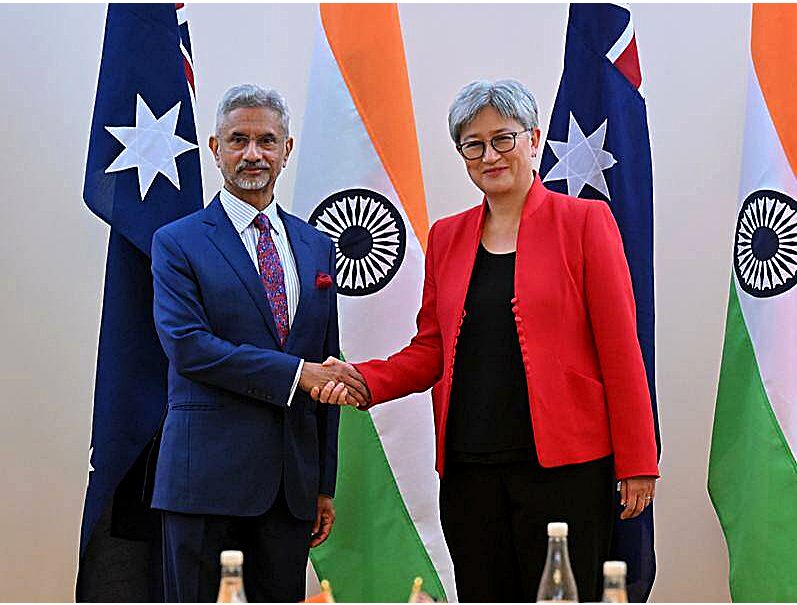India’s Foreign Minister S. Jaishankar voiced serious concerns on Tuesday about the recent vandalism of a Hindu temple in Canada, calling it “deeply concerning.” His remarks came during a visit to Canberra, where he met with Australia’s Foreign Minister Penny Wong, who also acknowledged recent similar attacks on Hindu temples in Australia. Meanwhile, in a separate incident, New Zealand police announced they were investigating an arson attack on a mosque in Auckland, further underscoring security concerns for religious sites.
Jaishankar’s comments reflect heightened tensions between India and Canada following the expulsion of six Indian diplomats by Ottawa, which linked them to the killing of a Sikh separatist leader in 2023. Canadian authorities have accused the Indian government of targeting South Asian dissidents within Canada—a claim New Delhi strongly denies. This allegation has worsened diplomatic relations between the two nations and heightened tensions between pro-Sikh separatist groups and Indian officials.
In Australia, two Hindu temples were vandalized in Canberra last month, drawing public concern and prompting statements from Foreign Minister Wong. She expressed empathy for Australia’s Indian community, stating, “People across Australia have a right to be safe and respected. They have a right to peaceful protest and to express their views peacefully.” Wong emphasized, however, that there is a distinct line between peaceful expression and acts of violence or vandalism.
During his visit to Canberra, Jaishankar and Wong discussed a range of issues, including the current tensions between India and Canada. While Australia respects Canada’s judicial process, Wong made it clear that Australia does not condone violence or hate speech. She also noted that Australia had conveyed its views to both India and Canada, emphasizing the importance of respecting judicial proceedings while maintaining public safety and tolerance.
Jaishankar also addressed Canada’s actions toward Indian diplomats, specifically raising objections to their alleged surveillance. He expressed frustration over what he described as a lack of transparency and evidence from Canada, stating, “Canada has developed a pattern of making allegations without providing specifics.” The implication that Indian diplomats were under surveillance has intensified India’s grievances, as they view this as a breach of diplomatic protocols and a threat to their officials’ safety.
The series of vandalism incidents in both Canada and Australia comes at a sensitive time for Indian communities in these countries. These incidents have not only raised security concerns but have also put a spotlight on the broader issues affecting diaspora communities. In Canada, where a significant Sikh population resides, the support for a separate Sikh state—known as Khalistan—remains a divisive issue. Many in India view pro-Khalistan groups as extremist and believe these groups pose a threat to national unity and security. In response to growing activism among separatist groups abroad, India has been vocal in urging foreign governments to curb activities that promote division or incite violence.
Australia, which also has a sizeable Indian diaspora, has seen rising concerns over hate crimes targeting minority communities. Foreign Minister Wong’s remarks highlight Australia’s commitment to ensuring the safety and dignity of all communities, while maintaining a zero-tolerance stance on vandalism and hate-based violence. She reiterated that while Australia respects freedom of expression and peaceful protest, it will not tolerate actions that cross the line into criminal behaviour.
The ongoing tensions between India and Canada, coupled with these incidents in Canada and Australia, have underscored the challenges in balancing diplomatic relations with domestic security. As Canada pursues its investigation into the killing of the Sikh separatist leader, New Delhi remains adamant in denying any involvement, calling on Canada to provide concrete evidence before making public accusations. India’s concern over the safety of its citizens and diplomatic staff abroad remains a priority, particularly in light of these recent acts of vandalism targeting religious sites.
As the situation evolves, it is likely that Indian communities in Canada, Australia, and New Zealand will continue to monitor these developments closely. The recent arson attack at the Auckland Mosque in New Zealand adds another layer to these concerns, as religious and ethnic communities in these countries look to local authorities to ensure their safety. Both Australia and New Zealand have pledged to protect the rights of minority communities, recognizing the importance of maintaining a society where people can practice their faith and live without fear of targeted attacks. –TIN Bureau


